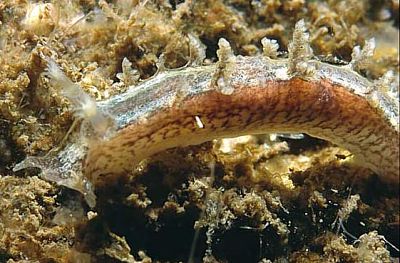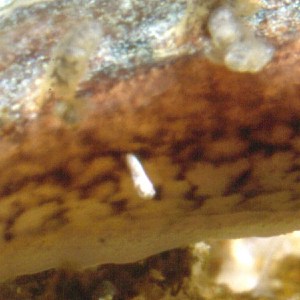
Tritonia plebeia
Johnston, 1828
Order: NUDIBRANCHIA
Suborder: DENDRONOTINA
Family: Tritoniidae
DISTRIBUTION
NE Atlantic from the Arctic to the wstern Mediterranean.
PHOTO
6 metres on a reef near Craig'n Gelt at Dunbar, east coast of Scotland. 27 May 2001. Photo: Jime Anderson.
Grows to 30mm in length but seldom longer than 20mm. Feeds on the soft coral Alcyonium digitatum with paler animals on white colonies and darker coloured animals on yellow colonies.
Reference:
• Johnston, G. (1828). A few remarks on the class Mollusca, in Dr. Fleming's work on British Animals; with descriptions of some new species by George Johnston, M.D. Fellow of the Royal College of Surgeons of Edinburgh. Edinburgh New Philos. Journ. 5: 74-81
Rudman, W.B., 2001 (June 5) Tritonia plebeia Johnston, 1828. [In] Sea Slug Forum. Australian Museum, Sydney. Available from http://www.seaslugforum.net/find/tritpleb
Related messages
Re: Tritonia plebeia
June 9, 2001
From: Jim Anderson

Dear Bill,
The attached detail from a more detailed scan shows the 'spike'. Could it be from a sea urchin? My other slides of the same animal show no more detail.
Regards,
Jim A
jander4454@aol.com
Anderson, J., 2001 (Jun 9) Re: Tritonia plebeia. [Message in] Sea Slug Forum. Australian Museum, Sydney. Available from http://www.seaslugforum.net/find/4527Thanks Jim,
Certainly could be a sea urchin spine
Cheers,
Bill Rudman
Tritonia plebeia from Scotland
June 7, 2001
From: Jim Anderson

Dear Bill,
This Tritonia plebeia was found near a colony of Alcyonium digitatum at 6 metres on a reef near Craig'n Gelt at Dunbar on the east coast of Scotland. Water temperature 12 deg C during a dive, mid morning, on 27 May 2001.
Regards,
Jim A
jander4454@aol.com
Andesrson, J., 2001 (Jun 7) Tritonia plebeia from Scotland. [Message in] Sea Slug Forum. Australian Museum, Sydney. Available from http://www.seaslugforum.net/find/4467Thanks Jim,
Another new species for the Forum. Have you any idea what the white think is sticking out of the side of the animal? I thought at first it may be part of the reproductive system but it is on the wrong side of the body.
Best wishes,
Bill Rudman
